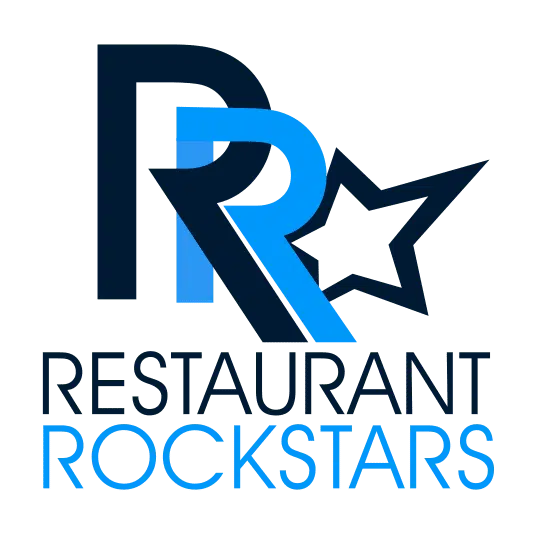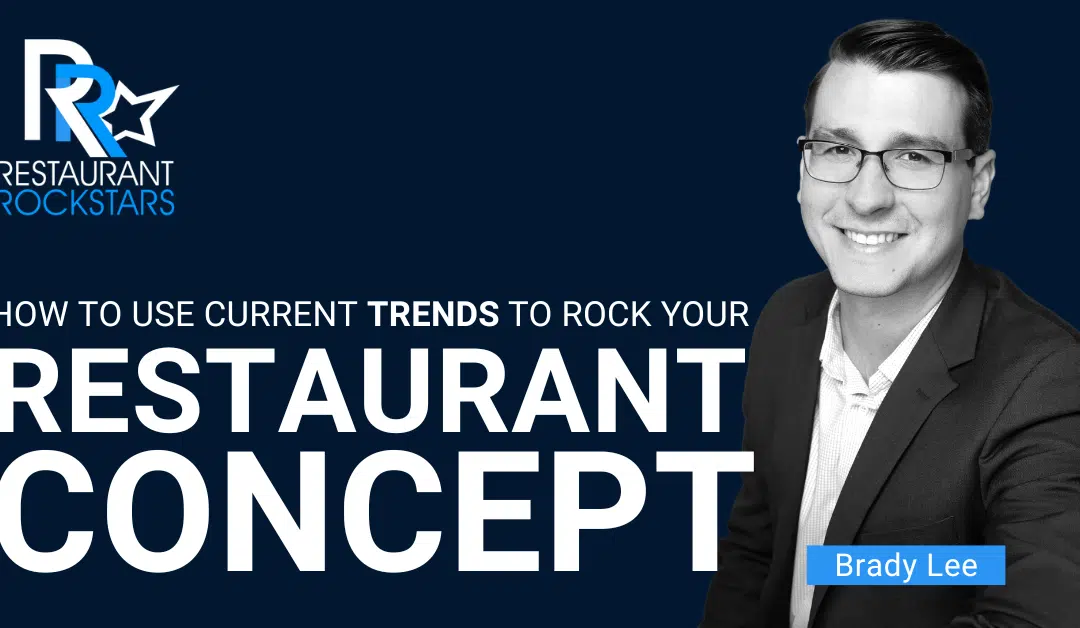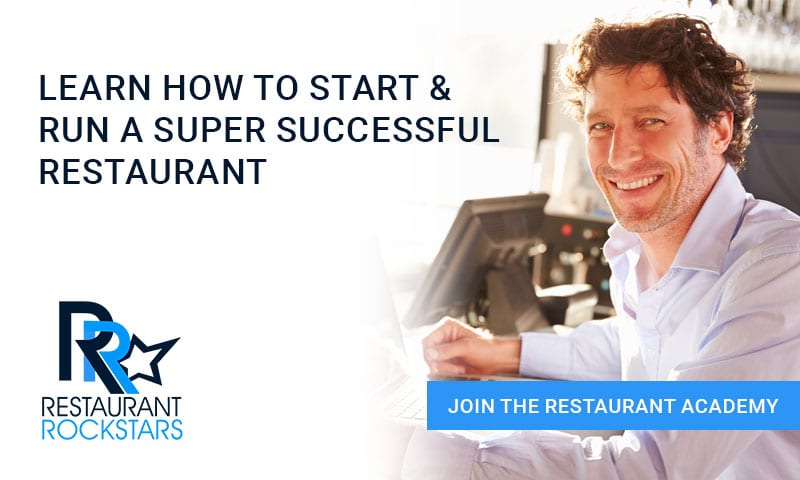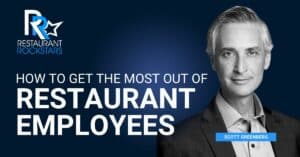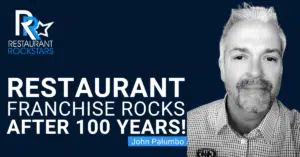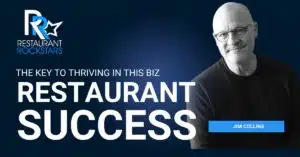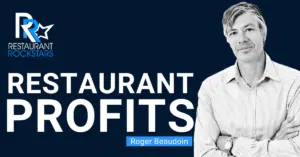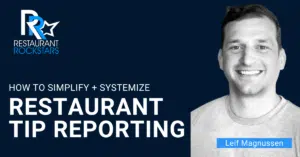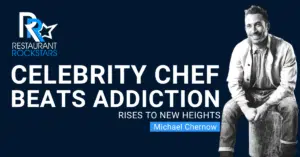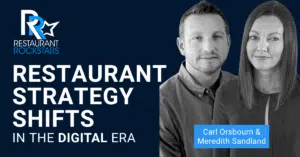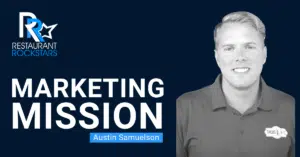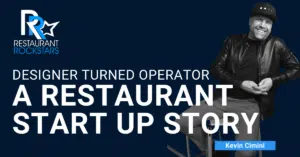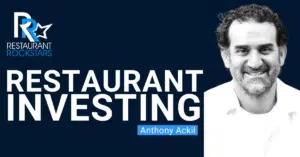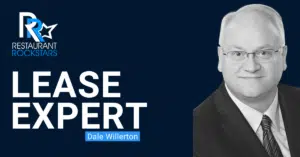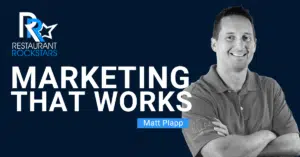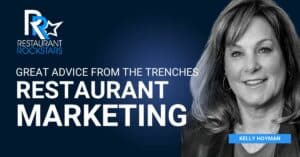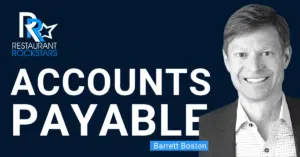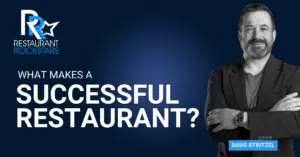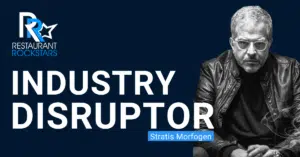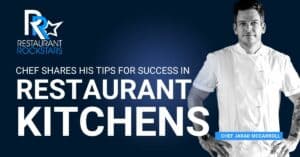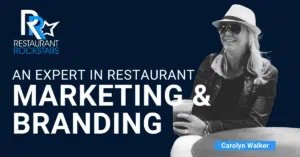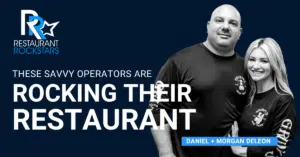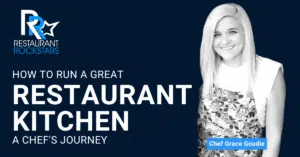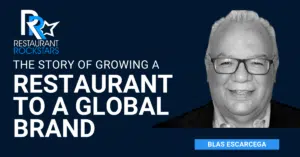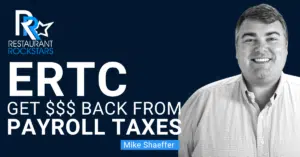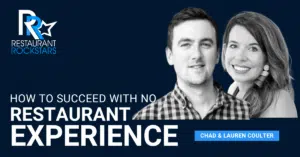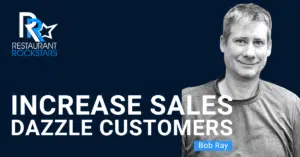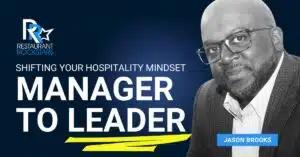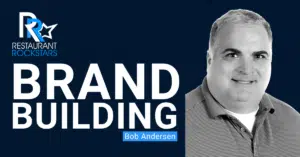Restaurant Rockstars Episode 326
Using Current Trends To Rock Your Restaurant Concept
LISTEN HERE OR ON YOUR FAVORITE PODCAST PLAYER
Prefer to watch the interview?
Click the video below.
There are a lot of restaurant concepts out there. To build a strong growing brand, you need to create something that catches the public’s attention!
When selecting a place to dine, there are many times when we just feel like trying many options. We graze on this, and we try that.
In this episode of the Restaurant Rockstars Podcast, I’m speaking with Brady Lee, the President of Graze Craze. Brady is building a restaurant concept based on grazing and current trends with food boards.
Listen as Brady shares:
- The brainchild of this restaurant concept and evolution of the franchise’s growth
- Why “grazing” is trending now, but will stay relevant
- How “Grazologists” curate unique charcuterie boards and picnic baskets
- The profitability and benefits of catering (house parties, work events, group picnics) to this restaurant concept
- Building a base of commercial customer accounts
- Why more customers appreciate eco-friendly packaging
- The labor crisis, training philosophies and building team loyalty
And much more….
Watch or Listen to this episode and then go out there and Rock YOUR Restaurant!
Roger
Connect with our guest:
0:00
This style of eating has really been around for, you know, hundreds of years. And, you know, our founder, she actually grew up in England. And, you know, over and over in Europe and England, you know, grazing style food and charcuterie and all that has been very popular for a long time. And, you know, that’s that’s how she grew up, you know, eating grazing style food and eating off eating charcuterie boards. And, you know, we like to say, with charcuterie boards, there’s a little bit of something for everybody on there. And that’s kind of the way that we kind of designed the boards.
0:38
Hey there and welcome back to the podcast. I meet a lot of really interesting people on this podcast and out in the restaurant world. And I see lots of different concepts. Well, in this episode, this concept is really unique. It’s all about custom crafted and curated shark history boards, and picnic boxes, very convenient for guests. You know, the pandemic has shifted the way we all do business, but this concept is really poised for the future. It’s got a catering angle to it. Lots of nuggets here, you’re not gonna want to miss this episode. And thanks to our sponsors this week, works the birthday club and serve the restaurant training app. Now on with the episode.
1:21
You’re tuned in to the restaurant rockstars podcast powerful ideas to rock your restaurant, here’s your host, Roger Beaudoin.
1:36
Hey rockstars, let’s talk Restaurant Marketing. I started and ran five high volume restaurants and I was obsessed with marketing, not the traditional kind. We try this and you try that and you hope for the best. That’s like dumping $100 bills out the window, but nobody’s coming in the door. I’m talking about marketing that’s trackable where you know exactly where the business is coming from, and most important that it delivers far more than every penny you spend. So here’s where my friend Dyson comes in. He’s a restaurant person just like you owned his own concepts. Now he runs fanConnect. He’s got something called the birthday club that’s proven to drive new and repeat business in your door because everybody has a birthday. He does it all for you to all the heavy lifting. All you have to do is focus on your guests and delivering true hospitality. Why not speak with Dyson yourself. He loves talking shop with operators and there’s no obligation, but I’m pretty sure he can boost your business and put more butts in your seats. If I still own restaurants. It’s exactly what I do. Check it out at fan connect.com/birthdayrockstar
2:48
Restaurant owners and managers Listen, this is important. If you haven’t heard of the employer retention credit, your business can receive lots of money back from the IRS money you’ve already paid in payroll taxes. Now the ERC program as it’s known is available if your operation had fewer than 500 employees, you had to shut down or partially suspend your business or you had at least a 20% reduction in business due to COVID 19 in any quarter of 2020 and the first three quarters of 2021. Now how much is the credit up to $7,000 back per employee per quarter for 2021 and up to $5,000 per employee in 2020. Listen if you have 10 employees today and meet the requirements you could receive up to $260,000 back into refundable tax credit. Now the faster you apply it, the faster you get the cash. Think of it as found money that you can use for any purpose payroll cost of goods, business improvement or other business expenses. Again, best of all, you do not need to pay this money back. Now whirks is a company that will do all the heavy lifting for you and get your business back the money that’s due. I’m speaking from experience here with works I received a sizable amount back in all available quarters for my former restaurant and I couldn’t be more pleased with their service their people and their process for a no obligation consults. Click the link for whirks in the show notes to this episode. Don’t miss out. Get your consult today.
4:21
Welcome back, everyone. This is the restaurant rockstars podcast. We’re glad to have you with us with me today. Mr.Brady Lee is the president of a concept called Grace craze. Very unique, interesting concept. I can’t wait to get into that. Welcome to the show. Brady, how are you today?
4:38
I’m doing great. Thanks for having me.
4:40
Awesome. Well, as my guests know, I always start with the backstory of my guest in the food space, what they’ve done and how that led to their current position. So I understand that you’ve been involved in franchising with different food concepts. So tell us about your experience.
4:55
Yeah, great. So you know, I’ve been in franchising pretty much my entire life. I’ve been with United Franchise Group for about 10 years now, United Franchise Group we own and operate nine different franchise companies, three of them being in the food industry and Grace craze being our newest addition to our food division. But, you know, the beginning part of my career was actually focused more on the marketing side. So I would work with some of our brands, really early on out of our franchise development department and kind of help get them off the ground help from a website perspective marketing plans, presentations, and things like that. I did that for a while. And then I actually ran that department for a couple of years, where I oversaw our marketing budget, and I worked with our team, not really working with any one brand in particular, but just overseeing our franchise development department from that. And from there, I actually moved over to Australia, where I worked out of our corporate office in Sydney, and I was our director of franchise sales over there. So not really working with any one brand in particular again, but just overseeing the growth effort nationally for Australia. And for us, at U of G here, Australia is actually our second biggest market, outside of obviously, the US so, spent some time over, Down Under and came back to the US and then I actually took over as the president of accurate franchising. And for us, accurate franchising is the consulting arm of the company, where we work with businesses who actually want to become a franchisor and go through the process of franchising their business. You know, and with accurate franchising, we see kind of the full gamut of everything. It’s not, it’s not any, we’re not focused on any one industry in particular. But food is obviously, you know, one of the one of the hotter industries in franchising, so dealt with a lot of food concepts. And with that brand, like I said, before, it’s more of a, it’s more consulting. So we go in, and we work with people who were just kind of getting off the ground, sometimes they just have one location. And, you know, they’re really just getting started, sometimes they have multiple locations. And they’re, they kind of just need help from a paperwork standpoint, we and we’re ready to go. So I ran that brand for a while. And then I took over as our Chief Operating Officer here at United Franchise Group in May of 2020. So smack dab in the middle of pandemic right time to hop into a new role from that, and but, you know, I oversee a few different departments. But you know, my team from a USG standpoint is what we call shared services. So we’re different departments and groups of people that will actually work with all of our brands that we have here at UMG. And oversee everything from the it to the whole launch process. So finding locations, negotiating leases, working through the build outs of the locations, training and all of that. So we’re a very unique company here at USG. Because we have nine different brands and a lot of different industries. But our food division is our newest, newest, you know, kind of division that we’ve built up over the last few years here at USG and grays craze is our newest one. And we’re really excited about it.
8:29
You know, I really want to get into the ins and outs of franchising that’s going to come a little bit later in this in this session. But let’s talk a little bit about Well, it’s an interesting concept. And it’s an interesting name, we all know what grazing is, of course, you know, you kind of wander around, you don’t really have any sit down meals, you go in the refrigerator, you see something interesting you take a bite of this a bite of that couple hours later, you might do the same thing that to us, I or to me is grazing. But let’s talk about what is the gray style food category per se. And what does graze craze offer? Let’s tell us about the concept.
9:03
Yeah, yeah. So, you know, grazing as a as a as a term is a little bit newer, you know, it’s over the last few years, it’s really picked up popularity, but this style of eating has really been around for hundreds of years. And, you know, our founder, Carrie Sylvester, she founded the business back in 2018. She actually grew up in England, and, you know, over and over in Europe and England, you know, grazing style food and charcuterie and all of that has been very popular for a long time. And, you know, that’s that’s how she grew up, you know, eating grazing style food and eating off eating charcuterie boards. And, you know, she, she started the concept like I mentioned in 2018. And when we met Carrie, you know, back in, I think it was end of 2020 early 2021. Um, it was really interesting to us because it was almost like a new food category within food. You know, it kind of seems like everything has been thought of already in the food industry. But, you know, we came across the grace craze and we met Carrie, we just love the business. You know, it’s a, it’s a niche business, it is for sure. But it also has a wide range of potential customers. And and, you know, we like to say with charcuterie boards, there’s a little bit of something for everybody on there. And that’s kind of the way that we kind of designed the boards to, obviously have your meats, you have your cheeses, but we have vegetables, we have fruit, we have homelesses, we have dips, we have chocolates. So you know, we want to have a little bit of something for everybody. And, you know, that’s kind of our goal from that end is to make sure that we’re not even though we are a niche concept is to make sure we’re not catering just one particular type of customer needs to have a wide appeal.
10:56
So Carrie, is an Air Force veteran, did she get out of the service, and then just come up with this idea, that brainchild for Grace craze, based on what you said, growing up in England, and that being a really popular style of eating? And then all of a sudden, she’s like, Oh, I’m going to start a restaurant. And it’s going to be based on you know, picnic boxes and charcuterie boards and all that sort of thing. Did she have one single location? And how did it lead to your group? And you just discovered and said, Oh, this has mass appeal. It could be a huge franchise. I mean, tell us about how that those two pieces came together?
11:29
Yeah. So Carrie actually started a test kitchen in 2018. You know, kind of dabbled in charcuterie like a lot of people have from home and done at parties and all that. And you know, she really started to get a little bit of notoriety in Oklahoma City, where they were they founded the business. And she started a test kitchen, trying out different boards, trying out different ingredients and seeing what fits well, with certain pairings and all that. And she opened up her first location and 2020 in the right before the pandemic started. So right when we were kind of on that line of when,
12:08
just before because, yeah, I mean, the pandemic started, like March of 2020. Right, and then everything went crazy from there. So literally, just before, here we go. Oh, that must have been a crazy time for her.
12:21
Yeah, yeah. And you know, what, what’s interesting is that she actually opened up three locations that year. So you know, that first one opened up right before the pandemic started. But the next two were right in the middle of a pandemic, you know, when people were still at home, and people were working from home, and everybody wasn’t sure what kind of was going to happen next in the world. You know, this business did really well, because it’s all a takeout and delivery, there’s no, there’s no dine in, there’s no sit down. So, you know, it’s it’s a, it’s a business that really did well during the pandemic, just because of the way that it’s structured. Yeah,
13:02
where were the original locations.
13:04
There’s three, the first three that that she opened up was an Oklahoma City.
13:08
Okay. Interestingly, I’m originally from Massachusetts, I was on the website, looking at the different locations. And obviously, I see this Florida, and it is starting to spread around the country. But you’ve got an Amherst location, which is a college town, really close to where I grew up, I found that kind of interesting. So Oklahoma City. So then what happened next, okay, she’s got these three stores, they did well, during the pandemic. And you know, where they were all in the Oklahoma City area, like within a certain radius of so she could kind of monitor each store and be in each location and that kind of thing, because that’s obviously important when you’re not necessarily, you know, really well versed in the ins and outs of running restaurants, per se. But what happened? Yeah,
13:50
all three of them were in different suburbs of Oklahoma City. So, you know, this, this business is it’s not a it’s not a full service restaurant. So, you know, you really only need three, maybe four employees on at a time to run the business. So it does lend itself to having multiple locations, but also being able to manage multiple units at the same time. So yeah, Carrie had managers in each store, and then, you know, have actually hired a district manager who kind of oversees the other managers as well. But it’s funny, you mentioned that Amherst that stores actually opened it up next week. Oh, it’s a new it’s a new one that’s opening. It’s a brand new one that hasn’t even opened up yet. So Right. You know, hopefully you can, you can support the local business and maybe get a couple boards.
14:37
Well, you know, it’s so interesting, because that is a small town in Massachusetts that has a university to Massachusetts down the street that has like 30 or 40,000 students. And this whole concept, I think, lends itself well to that town. I think it was well selected. So your group was part of the selection process or you decide on locations or how did that work?
15:00
Yeah, so all of Kerry’s stores that she has are considered corporate locations. But you know, we’re the franchisors so we met Carrie, like I said, and the 2020, early 2021. And she was actually introduced to us through a Transworld business advisor, which is one of our other franchise brands that we actually own and operate as well. So he was a local guy in Oklahoma, and he made the connection from that. And then, you know, for us at the time, we were looking to add another brand to the food division. And, you know, we’re looking for something with smaller footprint, didn’t require a lot of employees to run the business and was also a little bit lower on the investment side, because we had two other brands. And we wanted something that was different, something to diversify and Grace, Grace kind of ticked all of those boxes. But we took on the franchise company where they were running the franchise company, and Carrie is running her corporate unit. So all of the units that are underneath the called the USG umbrella, are all franchise locations. So we’ll work with the owners, you know, locally in their area to help find them a location that we’re, that works best for them and for us.
16:17
Now, franchising in the restaurant space can be really complicated. If you’re starting from scratch, it takes endless amount of time, and endless legal fees and hours, and all that sort of thing and putting manuals together and training systems. But that’s what your company obviously specializes in. So whether it’s food or whether it’s another industry, is there sort of a common roadmap template to starting a franchise like this. And you you mentioned, you have other food concepts as well. But obviously, it must cut the time and the legalities and everything when when you recognize something, you know, in your heart, or in your guts, is this gonna turn you know, take the world by storm or even the country is that kind of how it goes. I mean, I’m really curious, and my audience probably is, as well, because there’s a lot of independent operators out there that think they’ve got a really special concept. And they know that it can grow far beyond what they’re able to achieve on their own. But again, franchising can be a really daunting process, especially if you’re trying to run a restaurant and trying to start a franchise at the same time. So do you want to walk us through what a typical process would be like, and the steps and the time and all that sort of thing is, can you do that for
17:24
us? Yeah, I mean, there’s, there’s a lot that goes into it. There’s a lot to go into franchising. And, you know, as I was the president of accurate franchising, when I was working with business owners who wanted to franchise, I would ask them sometimes why they’re looking to franchise, okay. And sometimes people would say, you know, what, I’ve been running my business for 10 years, I just don’t want to work as hard. So I want to franchise my business. Now tell them if you’re not looking to work as hard, you probably shouldn’t look to franchise because it’s a lot of work, you know, and it takes time to develop systems and develop processes. But for us that United Franchise Group, yes, if there’s a template, there’s not really a template to franchising a business. But for us, we’ve almost kind of created our own template at USG. So Grace craze is our ninth brand. We started with Signarama, back in 1986, with our with our first brand. And over the last 3536 years, we’ve built up systems and processes in place to be able to pop a brand and really easily. So we already have the infrastructure we already have, like you mentioned, legal, we have a legal department, we have an accounting department, we have a technology department, we have a training center. So for us, we’re able to add brands quickly and be able to expand quicker than, you know, if somebody were to try to go in and alone. And you know, for us, we like to say, you know, the partnership between us and Carrie and her team. It’s kind of a perfect marriage because we’re an expert in franchising, and she’s an expert in charcuterie. So we work together on on we’ve worked together for for the last year and a half or so of making sure that we have built it the right way and making sure that we have the infrastructure to have a quick launch. But you know, I’m a little bit biased. I said, I’ve been in franchising my whole life. But you know, franchising to me, is the best way to grow. And the best way to scale your business. So you have to do it the right way. But it’s much easier to franchise and to grow quickly than it is to just kind of do it on your own and have a whole lot of corporate units all across the country, for sure.
19:40
And consistency and standard practices and procedures and the menus all that has to be pretty much standard across the unit. Right. Is there any opportunity for a new franchisee to have sort of their own direction in this I mean, obviously, you take the framework and you’ve got a proven menu and the names are interesting You know that but is there any opportunity for someone to come up with a bright idea and say, Hey, can we do this? Or how strict is your franchise in terms of keeping to the original concept?
20:11
Yeah, I mean, for us, it’s, we want entrepreneurs. And this business itself is a creative type business. So it definitely lends itself to people trying new things and trying out new ideas. And we’re very collaborative with our franchisees. So we want our franchisees to come up with new ideas and bring them to us, you know, we’ve said that for the last 35 years years, we get most of our best ideas from our franchisees, because they’re the ones that are in the field, doing it and, and trying out new things, and trying out new ways to help grow the brand. And what we do is take some of those ideas and facilitate them to the rest of the system to the rest of the franchisees and, you know, sometimes, you know, sometimes that you may have an idea that a franchisee brings to us, and we say, That’s a great idea. Go try it, go test it out and see how it goes. Sometimes we, you know, we may get an idea from a franchisee, and maybe tweak it a little bit and say, That’s a good thought, but maybe have you thought of doing it this way, and it works well. Or if a franchisee came to us and said, Hey, I want to start selling pizza or ice cream out of our location. That you know, that’s exactly that’s, but yeah, exactly. But you know, for us, it’s a balance to making sure that we’re maintaining brand integrity and not straying too far. But also making sure that we’re continuing to evolve the business and continue to grow it. Because for us, right now, we’re the we’re it’s great to say we’re the largest charcuterie franchise in the world, because we’re pretty much the only one. So, you know, from our standpoint, you know, we know that we’re kind of the first in this category, but we know there’s going to be people that pop up that you know, will be copycat, or we try to try to try to take something similar to what we’ve done. So we don’t want to just sit back and rest on our laurels. We want to continue to grow the brand and make sure that we’re always at the the cutting edge of the next step of making sure that we’re, you know, the best that we can possibly be.
22:08
When we say charcuterie most people are thinking meats and cheeses, but it goes so far beyond that, can you describe or define what that word really means and how that relates to your concept and what your actual offerings are? Yeah,
22:22
yeah, sure. So for us, we really have we have four main boards we have the the gone grazie, which is the the kind of the standard classic board that has a little bit of everything. Like I mentioned before, it’s got meat, it’s got cheeses, it’s got vegetables, it’s got fruit, it’s got dips, it’s got chocolate, but then we also have a Keto board as well. For people that are using the keto diet or just looking to drop a few pounds. We have a vegetarian board that’s a the veggie grazie and it’s this straight for for vegetarians. And then we also have the sweetened grazie, which is our dessert board. So you know a lot of people will sometimes they’ll get two boards look at the larger the gone. Grazie the big board and they’ll get a smaller, maybe sweet and grazie for a little bit of dessert so loved and we want to keep the menu simple, like I said, we just have the four main boards, we don’t want to go to steer too far off of that, but, you know, we’re always evaluating the boards and making sure that you know, the franchisees one can be as profitable as possible, but also making sure that we’re we’re also we’re also maintaining the presentation, because that’s really, really important for us. Because it’s a it’s, it’s, it’s a type of food and the type of business that people want to take pictures of. So we want people to take a picture of it posted on Instagram and tag us and try to gain an organic following kinda that way. So, you know, like I said, we want to keep the menu simple, but we also want to make sure that there’s a little bit of something for everybody.
24:02
Now, the boards are obviously ideal for serving, you know, serve several people, but you’re also doing picnic boxes that could be, you know, romantic date on the beach or whatever it is. Right. So is the menu perhaps based off the charcuterie boards itself when you go to a picnic box? Was that entirely separate?
24:22
No, it’s all it’s all the same ingredients that are on the board. Yeah, so that doesn’t change. So we have, we have boards we have usually we have four different sizes of boards. But it all is the same ingredients. It’s just kind of scales down obviously the smaller that the board is from the from the larger one.
24:41
Gotcha. Now all these I love the word curated because it definitely lends itself to crafting, to specialization. And these are all handcrafted using the finest ingredients of course and you call them in house. Grazieologists right so people are actually trained in this sort of technique when they become a franchisee. of the company, they come in, you mentioned, you’ve got sort of a training center, right. And they’re learning how to put all this together as well as business practices. Tell us about the process of, you know, I’m a new franchisee, and I’m now coming in for training, what am I going to learn? And how soon before I’m actually operating a unit? Sure, yeah.
25:19
So our corporate headquarters is in West Palm Beach, Florida, that’s where I’m based, that’s where that’s where we have everything down here. So, you know, from a training perspective, we do two weeks of training for the franchisee, or for manager. And that’s really and that’s done out of the corporate headquarters here. It’s done on site, we actually have a training school going on right now. And it’s really more about how to run a great grades, they’re not coming to West Palm Beach to slice meat or cut carrots or anything like that. It’s really more business ownership, how to run, how to manage what are all of our processes that we have, then we’ll do two weeks of additional training at the actual location. So that is really, when we’re diving into how to make all the boards and put all the boards together, you know, it’s more, our Grazologists that we that we call them, they’re more of it’s almost like they’re putting together a puzzle, more so than they’re actually putting together a recipe and cooking. So, you know, like I mentioned before, the presentation is very important. So it’s a lot of repetition, it’s a lot of making sure that they have all the right ingredients, the right amount of ingredients, and making sure that the boards look good. And you know that that’s really that third week of training is when we’re diving into all of that back to house. And then we have a fourth week of training at their location as well. But that’s all marketing. It’s all going out to different businesses, showing them how we get corporate accounts and how we have commercial accounts. And you know, we really like that, because that’s repeat business, you know that that’s going to be larger businesses that are that are going to consistently order from the from the stores, and that they can kind of count on on a regular basis. So it’s a four week training program. And, you know, once once we’re once we’re done with that they’re off to the races.
27:08
Yeah, I thought the commercial accounts was particularly smart for repeat business, like you said, it’s great. I mean, obviously, smaller businesses can do lunches. And they can obviously take on that and you’ve got the individual people with the picnic boxes, but obviously the commercial accounts would be awesome big hospitals, big businesses, all of that. And once they’re familiar with the concept, when obviously their their employees love it, then they’re more apt to obviously continue to contact you. This is all order in advance. Is it online ordering, what’s the time if I I’m spur the moment, it’s like, Oh, I feel like a charcuterie board how soon before I can actually get it if I’m in your neighborhood or down the street.
27:49
Yeah, I mean, a lot of it is ordered in advance. Because you know, charcuterie boards for the most part, it’s not a there’s not a whole lot of impulse buy, most people aren’t just driving by and saying, Hey, I feel like having a charcuterie board right now. But you know, so for the larger events for like, if there’s a wedding, if there’s a networking event, or, or whatnot, those are usually done in advance, and we have an online ordering system that people can order online, or they can call in and we can do the order for them. But we do have, particularly the smaller boxes. So particularly like the lone grazer, or the picnic boxes where, you know, people just just want something for lunch, something quick, something that is not heavy that they can kind of pick at, you know that we do see a little bit of a lunch rush for some of the stores that you know, are nearby other businesses that have maybe like, like, like a bartenders or waiters or people who worked at a gym or something where they don’t really just sit down and eat a full meal, they kind of pick at it, they take a bite, and they go, you know, take the next order or whatever. So, you know, there is quite a bit of that. But the for the most part, a lot of the larger orders are done in advance.
29:06
How much time in advance would you say is typical, and these are obviously cold storage products where, you know, they’re prepared. They’re wrapped prepared to package to go and then they’re sitting waiting for people to pick them up. You know, somebody calls in advance or somebody orders it. How long is a board prepared before it’s actually picked up?
29:26
Yeah, I mean, it depends on the event, you know, what we’re, we’re preparing it’s same day. So it’s not like we’re preparing it a couple of days in advance. And it’s just sitting in a in a refrigerator or anything like that. But it’s all fresh, it’s all freshly. Everything’s fresh cut, everything’s fresh slice. And so we don’t want to have it sitting around for a while, even though it’s I mean, it’s curated meats and cheeses and it’s vegetables. It stays if you keep it in a fridge, it stays good for a while, but we want our customers to have the best experience so we make sure we do it same day and That’s when the orders go out.
30:01
So it is an interesting concept and it is an alternative to traditional catering that no one would necessarily think of until, you know, awareness is built, what’s your marketing plan and say a new franchisee? Has a store opening coming up? Describe the whole marketing plan and strategy for the launch? And how do we get awareness within the community, not only with individual people, but commercial accounts? Obviously, you’ve got all that worked out, too.
30:28
Yeah, yeah. Now we have a, we have a really good marketing plan to where we actually do a little bit of pre marketing before the stores even open. So we want to make sure that we’re starting to get the name out there. A lot of it’s done through social media, we have Tilson who’s who’s on the call here, they do some PR articles to let people to let the local the local neighborhood know that the store is opening, and it’s coming up. And then once it opens, we still do some couple more PR articles after that. But we have a couple of really great marketing partners that it’s it’s a blend, it’s a blend of online marketing, and it’s through social media and through pay per click and things like that. We have the PR firm. And then we have another company field day that we use that does, I guess more traditional boots on the ground marketing, where they’re just going into businesses, and they’re trying to spread brand awareness and get some catering orders from that end as well. So it’s more of a three tiered marketing plan that we have. And, you know, it’s our goal is to get the name out there and get franchisee successful right off the bat.
31:36
Your packaging is also eco friendly. Let’s talk about that. No, it can actually some of it can actually be repurposed, right in the future for other people, you know, holding foods or for leftovers or whatever, but it’s sort of it’s like gift wrapped. It looks like something really special when you pick it up, right?
31:54
Yeah. Yeah, most of our packaging is it’s balsa wood. So it’s, it’s eco friendly. It can be repurposed, like you said, you know, for the larger boards that you know, can feed 10 to 12 people there more of a solid board? Because it’s almost easier to eat didn’t have how many food? Yeah, exactly. So you can’t really have anything flimsy on there. But you know, people re reuse the boards, you know, for for their own purposes. And whether it’s a serving tray, or whatever, it’s it’s like I said, it’s more of a solid board. But you know, it was important to us to make sure we had eco friendly packaging, and especially with the kind of food that we have it’s healthier food. And it’s, you know, it’s better for us. So we also wanted to kind of package that with something that was also healthier for the Earth.
32:42
Can you speak to profit margins of these particular boards and what the food cost is in relation to the profit in terms of we know that the labor cost is relatively low, because it doesn’t require a tremendous amount of staffing to operate a unit. So obviously, food and labor costs are the two biggest expenses in any restaurant concept. So obviously, you’ve got that dial to that, you know, the financial controls are in place, the portion controls, the standardized procedures and all that, but how profitable is it to sell a board versus a picnic box to go versus whatever?
33:17
Well, it has to be a little bit careful with the way that we kind of talked about profit margins because from a franchising standpoint, there are kind of rules and regulations of what we can and can’t say. But we have our if anybody’s interested in learning a little bit deeper about the profits, we have what’s called the Franchise Disclosure Document that has some has the numbers as the gross sales, the gross profit and net profits of the first three stores in that in that document. But based off of the Franchise Disclosure Document those three stores, they were all profitable within their first year. So you know, it’s it’s a business to where it’s not a it’s not a restaurant, right? So a lot of people are used to restaurants, where it’s huge volumes, but lower profit margins where there’s a lot of food wastage is really high labor. You know, we don’t have really any food wastage or food spoilage at all because it’s mostly meats and cheeses and the only kind of the only kind of food spoilage you’re gonna have is because you’re you’re constantly eating it and constantly sampling your own product so that that that’ll be where some of that product would go. But if anybody wants to talk look a little bit deeper into the numbers and dive into that we have our Franchise Disclosure Document which they can look at.
34:38
Fair enough. It also seems like inventory control is not much of a problem because obviously all the different ingredients are cross utilized amongst the different products and although each board looks very very elaborate, your storage needs aren’t tremendous. The square footage of the stores doesn’t need because it’s obviously not a sit down concept. What is an average square footage of a store?
34:59
Yeah, We’re looking at about 1000 square feet. So, you know, like I mentioned earlier, there’s no there’s no dining, there’s no sit down, you don’t need a you need a smaller lobby area. And there’s no hoods, there’s no grills most, most locations don’t need grease traps. So yeah, there’s not a lot to the back. It’s and it’s a, like I said, there’s not a lot of cooking. It’s really an intensive, is what I’m hearing, it’s not, you know, it’s not our, you know, everything all in, it’s under 200,000 to get a location open, which is, you know, from a, from a restaurant perspective, you’re never gonna find that anywhere. Yeah. But for us, what we’re able to do is we don’t need a lot of inventory, like you mentioned before, because we have a good relationship with a great partners with vendors that we can get fresh produce daily, if needed. And then the rest is just, it’s meats and cheeses, and its dips and all of that. So, you know, the don’t eat a lot of inventory. I mean, you start off with about five to $7,000 worth of inventory, and you kind of obviously scale up from there as your as your business grows. But yeah, it’s a it’s a, it’s a really unique concept within the food industry. And because it’s not a restaurant, it’s just, it’s in the food industry, but it’s not
36:17
a Commissary Kitchen on a small scale, right. Which is similar.
36:23
Yeah, I mean, it is similar to that, you know, we don’t do much cooking, as I mentioned, before, it’s baking, you bake the bread fresh, and you, you know, cook some of the ham a little bit of in a in an oven, but that’s it, you know, so it’s, it’s not even really, to even call it a kitchen is a bit of a stretch in the back end, because there’s not a lot of cooking. But there is obviously assembly of the boards.
36:48
Guys, I’ve always believed in systems to run a really effective restaurant, they say you have a system, if you can walk away and leave your place for a day, a week or a month. And it’s just as successful, just as profitable when you return, if not more. So. Now the staff are really the foundation to this. And it all comes down to the word empowerment, you know, if you’ve got really great people, and if you can develop those people that have your back, and to run it as if they owned it, treat everything as if they had to pay for it. That’s a super powerful system. Once you have the staff in place, it really comes down to three things. It comes down to one staff training, development, recognition and rewards to create what I call your dream team, how to empower your team to think and act like owners and to treat everything as if they owned it, and had to pay for it and to deliver amazing guest service experiences to your customers to serve and sell because sales are the lifeblood of your business, not allowing order takers on the floor. But teaching everyone to recognize opportunities and make suggestions that we know that customers will enjoy and appreciate. It all comes down to training, training, training, number two cost controls and maximizing profit. You need to know your critical financial numbers on a weekly basis. And it only takes 10 minutes, but you need to understand these things. How about your daily breakeven how much it costs you to open the doors to your restaurant each day. Inventory is not just walking around and figuring out what your order is that week. It’s knowing the true value of your goods on hand at any given point in time and you need this information to be able to calculate your true food and beverage costs. Your labor costs are also important and running a weekly labor analysis against sales. If you know these things, I can teach you how to maximize your profit and control your costs. And then number three is what I call marketing firepower and affinity. You know affinity is defined as a really powerful sense of loyalty and belonging where your customers become raving fans. And they’re like an army of brand ambassadors spreading the word for your restaurant. Well all of this is included in the restaurant rockstars Academy, if you really want to take your restaurant to the next level post pandemic, things are heating up customers are coming back. Now’s the time to really maximize your opportunities, maximize your sales and profits and create that dream team staff. Check it out at restaurant rockstars.com It’s the restaurant rockstars Academy
39:24
let’s talk about the vibe of the locations is that all standardized as well or you’ve got a standard logo and the standard sign and there are colors to use but can a franchisee sort of funk up the inside to make it their own versus all looks like if I if I was in Oklahoma City and I went to a grace craze and I went to one in Florida and then I went to Massachusetts so they all look relatively the same or is there some creativity allowed?
39:48
Yeah, they have the for the most part. When you walk into a Grace grace, you’re gonna know you’re in a Grace grace we’ve read has the same signage, you know, a lot of the same color schemes and all that we do give the franchisees a little bit of Lee way to, if they want to spruce up their lobby a little bit, I know we have a franchisee that’s putting a TV in the lobby that you know if people are kind of sitting and waiting for a board, which they shouldn’t be waiting very long, but you know, they can, they can either have the TV on or it can looping some of the products that they have. So we give a little bit of a little bit of leeway. But for the most part, if you walk into a grace craze in Massachusetts, and you walk into one in Dallas, you’re going to know you’re in a Grace grace,
40:28
has the labor crisis been a challenge for this company?
40:32
Not really, to be honest with you, you know, it’s this business, you need three or four employees on at a time. So it’s not like a lot of restaurants where you need 2025 employees to even be operational. For us, you know, you need three or four employees. And I think a lot of people who are in the food industry really gravitate towards wanting to work for Grace, Grace, because of quality of life standpoint. You know, our hours are typically eight to six. So, you know, a lot of people that have been in the restaurant industry, their whole lives there used to if it if they serve dinner, there used to be in there till midnight, or if they’re a breakfast place, they’re at four o’clock in the morning, preparing everything. So for us, our employees enjoy really the quality of life. Because they can they come in they they enjoy what they do, because they don’t You don’t smell like burgers or, or pizza or anything like that they enjoy what they do. And then they can go home and have dinner with their families. And so for us, we get a lot of people that are just used to grinding in the food industry for 20 years that say, Wow, this is still in food. And I can still use my skills and my background, but I don’t have the grind that a lot of typical restaurants would have.
41:46
I think I read on your website that you’re proud to state that the individual stores are locally sourcing their ingredients, is that true?
41:54
Some of the ingredients so the prot the produce is is locally sourced, you know, we have, obviously the meats and the cheeses and and all of that is done through our distributors. But but the locally sourced, there is some locally sourced products that’s available for the franchisees.
42:12
Okay, I didn’t want to get the wrong impression where I was going with this was obviously most franchise companies on a larger scale, use the same distributor for economies of scale and volume of purchase and all that kind of stuff to get the best pricing and all that. So that’s still does happen. Sure, yeah. Okay, great. Now you have the location specialist, or you help a franchisee find the best location in terms of traffic studies and walk by traffic drive through traffic, parking, all those types of things. I mean, what’s that process? Like?
42:43
Yeah, we have a real estate department that will look at demographics and look at and look at locations. The great thing about this business is you don’t need to be in an A plus shopping center, you don’t need to have a Chipotle on one side and a Starbucks on the other side and have 1000s of people coming by. Because like we talked about earlier, a lot of the orders are done in advance. You want to have good parking, we want good sign exposure for the franchisees to be able to kind of get the name out there and get out from a brand awareness standpoint. But we don’t want them paying huge, huge dollar, rent and all of that we want to keep the cost down. But also be in a in a good spot, but doesn’t have to be in that A plus really high end location.
43:27
So it’s convenience of pickup of course visibility, so you can easily find it but easily park so you can pick it up without a hassle. But other than that you don’t need like you said la plus location. That’s another smart thing. What would you say your key competition is?
43:42
I mean, really, there isn’t a lot of competition, especially from a franchising standpoint, I would say locally. There are there’s a lot of people that will do charcuterie boards from home, you know, they’ll advertise on Instagram, they’ll advertise on Facebook and you know, they’ll they will can gain a kind of a local following from that and but really what differentiates us a differentiate differentiates us from them is the fact that we have a larger scale of being able to produce a lot the big orders. So a lot of the people locally if they get really popular, they’re usually booked out months in advance because you can only make so many sharpshooter reports from home. But for us, that’s why we you know, that’s why Carrie and her team decided to go into more of the kitchen. Just because you know, you can fulfill larger orders. You can do multiple orders at once. And that’s how you know that’s how we can grow.
44:36
This is very Yeah, I mean, it keeps getting more and more interesting because it is niche. It is so different. It’s like I said it’s not really it doesn’t appear like it has much competition because it is so niche specific. That’s so interesting. Let’s talk a little bit about what you’re looking for. In a new franchise operator. You mentioned the word entrepreneurs, you’re looking for entrepreneurs obviously does that mean they’ve had prior or business experience not necessarily in food, but in another type of business? Or what are the key criteria you’re looking for?
45:08
Yeah, I mean, you know, for us, we have already, you know, we’re new, but we already have a really wide range of people that are that are our owners, you know, we have, sometimes you have groups that are going to be more of an investor type and you know, are going to be more, I don’t want to say I don’t like saying the term absentee, but not running the store day to day, they’re still going to be involved, they still need to know what’s going on. But then we also have a couple of business owners that are into it for starting their own business for the for the first time, you know, if they, we want to have one of two things, if they don’t, if they don’t have owner business ownership experience, we want them to have food experience, and you know, have experience working in restaurants and in the kitchen and know how to do inventory and scheduling and things like that. But we’re not limited to that. So you know, we do have a lot of investors that are just looking to open up multiple locations, hire managers, and, and kind of advise from a higher level. So from our standpoint, you know, we want like you mentioned, entrepreneurs, we want people that are going to come up with ideas and be team players and want to be part of growing the brand and helping move the brand forward. We don’t want people who are just going to sit in their, you know, behind in their lobby, sit at the front desk and expect everything that comes to them. We want people that are going to be out in their community growing the brand and and getting the name out there.
46:33
Fantastic. Now, what’s the growth plan? Exactly? You currently have about 20 locations, but I believe you’re you’ve got 100 in the works. Tell us about that.
46:43
Yeah, so we actually right now, as we said, we have 12 locations that are actually up and running, we should have about 20 by summertime. And we have a lot of locations that are getting ready to open up kind of as as we speak actually. And our goal is to have 50 By the end of the year up and running and have 100 locations by next year up and running. So with these with these locations, there’s that they can get open pretty quick finding yet once you find the location, a lot of these, a lot of these spots are pretty quick build time. So we can we can get these open pretty quickly. And you know, our goal, like I mentioned before, is to have 100 locations open by next year. But our other goal is to be the name synonymous with charcuterie because there really is no brand name associated with charcuterie at all. So charcuterie is a tough enough word to say as it is to say I want to graze craze board instead of a charcuterie board. And you know, that’s what we do. That’s what we’re great at growing brands and getting brand awareness out there. But we think once we get to that 100 point, that 100 mark, that’s when we say okay, well, we we know we have something here. And we already know that we do but you know, to the outside world, that’s where you kind of say, Okay, well, they have 100 locations. This is this is a big time company now. So
48:06
are there any states right now, or regions that you’re not necessarily considering for growth is part of the plan to have sort of a regional strategy to roll it out? Or literally, you can shotgun it anywhere in the country. And if you’ve got an interesting candidate to be a franchisee, and they can prove I’ve got a really viable location, it really doesn’t matter what state?
48:27
Yeah, no, we’re open to everywhere. You know, we already have locations that are opened up in in Utah and Dallas. You know, in Oklahoma, we have, as we mentioned earlier, location opened up in Massachusetts, but they’re opening up all over the place, we have a group that’s opening up multiple locations in Las Vegas, we have Charlotte, North Carolina, Raleigh, North Carolina, few locations in Florida as well. So we’re truly growing across the whole country. And, you know, for us at United Franchise Group, we have the infrastructure to be able to do that, if it was just carry on her own, and she was just trying to franchise the business, I would probably tell her, you know, grow, go smaller and kind of grow regionally, so you can support that. But we have support people already all over the country. So we already have the infrastructure to be able to grow quickly and to be able to, you know, scale much quicker than a lot of other companies would be able to. Well,
49:27
you know, this is a really interesting, we talked about how interesting the concept is, but I really like how simplistic it is. It’s not overly complicated. It seems to be pandemic proof. It’s got a lot of appeal to a wide cross section of consumers. It’s got the, you know, the corporate piece, it’s got the individual piece like you’ve it’s been well thought through. So it’s a very interesting concept and that is Graze Craze. Brady, thanks so much for taking time with us and being on the podcast. Thank you for having me. Thanks to our audience again. And for tuning in that was the restaurant rockstars podcast. We’ll see everyone in the next episode. Stay tuned and stay well.
50:07
Thank you, Brady, for sharing Graze Craze with us and your unique opportunity. Thanks to our audience for tuning in. I wanted to let you know that we have launched an all new website and an all new restaurant rockstars Academy at restaurant rockstars.com What’s the academy about? Well, if you’re starting your very first restaurant, or if you’ve been in this business a while and you’re just looking to improve up level and maximize your profits the academy is for you. It’s an all inclusive, it’s a course that will take you through the logistics of starting your first concept everything you need to know to open your doors to a restaurant. It follows up with staff training, to serve and sell teaches your entire front of house team how to recognize opportunities and sell and don’t forget, cost controls and profit maximization tools. It’s all in the academy so check it out at restaurant rockstars.com Thanks to our sponsors again, this week’s episode. Can’t wait to see you next time so stay with us.
51:07
Imagine both your front and back of house teams are so well trained that they’re executing flawlessly. Your front of house is doubling your sales, boosting repeat business and creating five star dining experiences. While your back of house is consistently preparing each dish to perfection on time and to spec having a restaurant this dialed takes a unique training system. That’s where srv comes in. Srv means study restaurant variety, and it is a powerful mobile training system custom built to meet the needs of your restaurant serve will uplevel your team’s knowledge and skills will maximize your profits and create experiences that guests will rave about. Picture this before the doors open for business. Susan, one of your managers is assigning srv training to Paul your new bartender. Using the app he will learn both food and beverage ingredients, allergens, romance notes and pairings. She shows Paul how to use srv’s interactive study tools to become a master of the menu and how to use the cocktail database to easily find specs to make any drink. He can’t wait to hit the floor and sees how served it will unlock his hidden sales potential. Susan will be able to track his training progress and test his performance. I’ve got this poll says next Susan just uploaded a brand new appetizer to the serve menu using the admin dashboard using serves menu profit tools. She’s determined that this new dish will have a major positive impact on the restaurants bottom line if the team is able to sell it. So she makes it a priority sale item and gets your front of house team on board to suggest it throughout the night. Meanwhile, in the kitchen, Steve your line cook pulls out his phone and uses serve to see prep notes on the new appetizer offering. Allow. He says here are all the ingredients the cooking steps and a photo of the plate presentation. This makes it so easy to learn this dish. Sally your server returns to her table with drinks and says man I now suggest you start with our new signature appetizer. It’s the perfect complement to the chef’s fantastic lobster special tonight. The pairs wonderfully with a bottle of Whitehaven Sauvignon Blanc. That sounds wonderful. The guest says we can’t wait to try it. Sally learned the suggestive sales by studying pairings on served. Srv also allows you to uplevel your management team with a comprehensive restaurant academy that includes efficiencies, inventory management, cost controls, and maximizing profit, menu engineering, proven marketing solutions and more surfing foods everything needed to develop your managers into rising stars in your operation. As the leader of your organization, you take pride in continuing to uplevel your operation and your team. You know that by investing in your people, jobs become careers, and everyone in your team feels empowered to perform at their best. As you can see, the possibilities with serve are endless. Srv is the key to unlocking your restaurants hidden potential, and will prove that the more your team is able to learn the more your restaurant will earn its srv and it’s a game changer. Ready to srv. Get started at SRvnow.com
54:34
Thanks for listening to the restaurant rockstars podcast for lots of great resources, head over to restaurant rockstars.com See you next time.
Transcribed by https://otter.ai
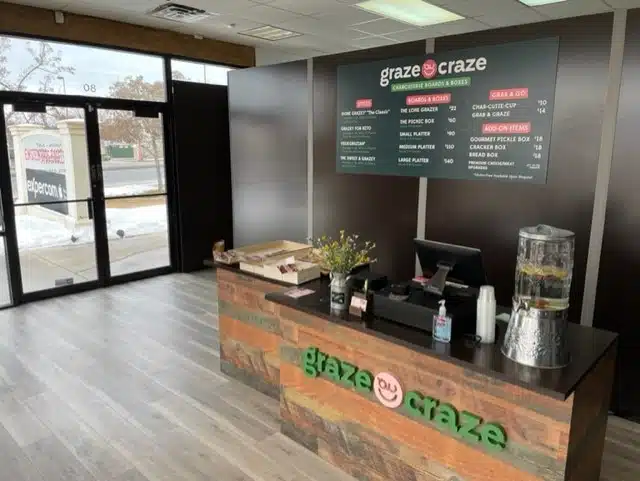
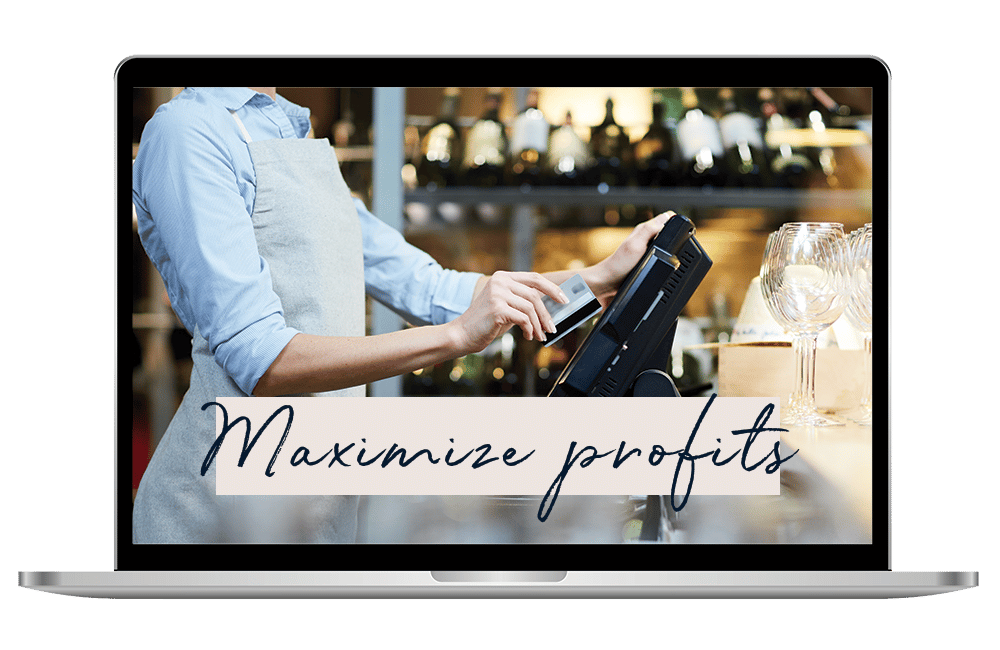
The three costly mistakes you could unknowingly be making?
Find out in this FREE guide and restaurant assessment specifically designed to reveal the unexpected hurdles standing between you and exponential business growth.
Thank You To Our Sponsors
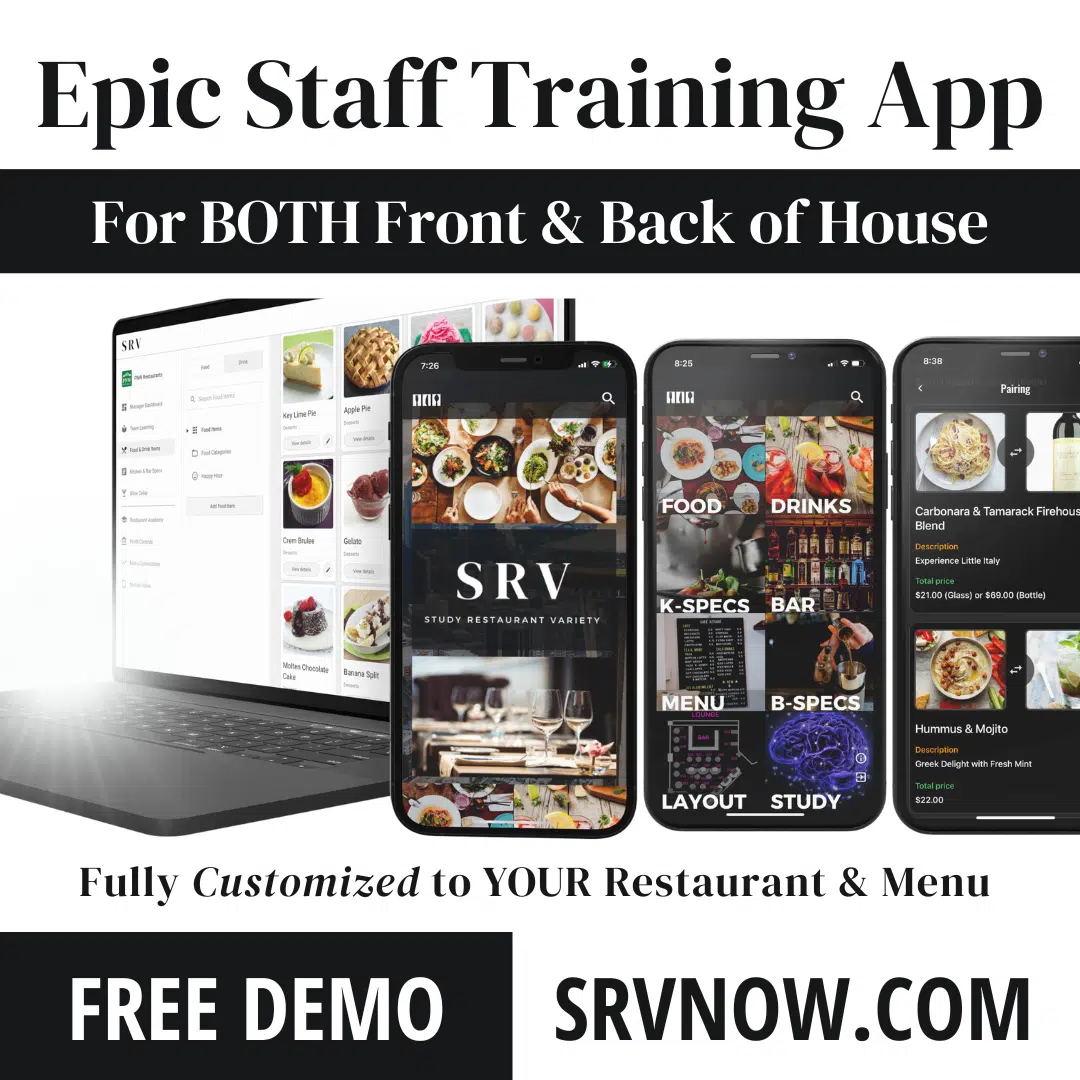

The Employee Retention Tax Credit We will help you determine your eligibility for 2020 & 2021 - Get Started
Want to become a podcast sponsor?
Please get in touch with Roger at roger@restaurantrockstars.com
